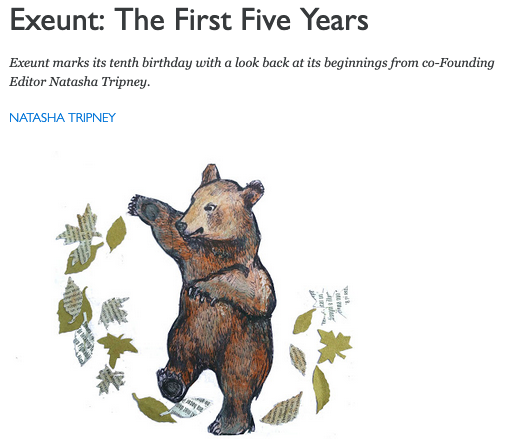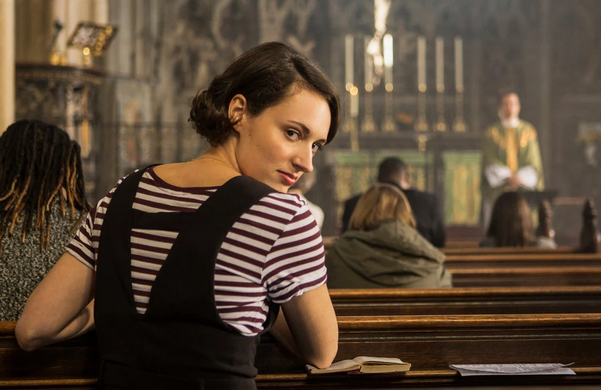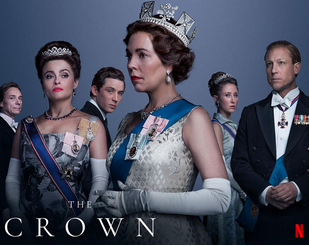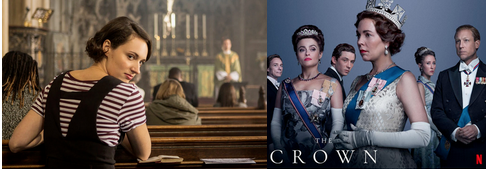I am as guilty — and insecure — as the next arts journalist, I realise, in contemplating my own navel as I look for whether there’s any substance beneath the fluff of navel lint that’s we sometimes find lurking in that strange human cavity.
But really, outside of the narrow world of fellow arts journalists, does anyone else much care when we file columns about the future of arts journalism, or celebrate our own achievements within it?

In the last week, I’ve read Natasha Tripney, founding co-editor of the online Exeunt, marking the website’s 10th anniversary with a retrospective look at the publication’s first five years, and found myself name-checked in the third sentence. Which is flattering, kind of, only that those named were provided by contrast to Exeunt’s more lofty ambitions. Oh, and we were also “heavily male-weighted.” (I’m used to being fat-shamed, but now I’m being weighed for my gender, too).
Never mind that each and every one of the men named had set up their blogs independently; my own contribution was a commissioned daily online column (that eventually found its way into the printed edition on one day a week). Still, the theatre blogging scene she describes was somehow to be faulted for failing to represent female voices.
So Exeunt stepped into the vacuum, apparently. She writes,
“Exeunt was created to fill a hole. At the time, there was a lively, if heavily male-weighted, theatre blogging scene including David Eldridge, Chris Goode, Matt Trueman, Dan Hutton, and the peerless West End Whingers. Mark Shenton documented the day-to-day life of a theatre critic in The Stage. The Guardian was in a flush period and offering space to a number of those voices in their theatre blog. But there wasn’t a publication that offered the kind of playful, joy-suffused, passionate, irreverent writing that you often found in film, music and food journalism. It didn’t exist, at least not in the UK, so we set out to rectify that, to create a space for play and experiment, for writers to hone their voice and sharpen their tools, while also expressing their love for the artform. As word counts were curtailed and budgets cut in the mainstream media, we had the luxury of space. Our reviewers could roam. They could stretch.”
What they couldn’t do, of course, is get paid for their efforts. So it became self-selecting, as an outlet where only those who could afford to write for free could do so.
That remains the biggest barrier to entry for aspiring critics today. Anyone and everyone can set up their own website blog — but how do they maintain, not just the will to do it, but to earn a living at the same time? I still don’t know the real answer to that, as my own paid outlets have shrivelled or changed ownership. I just know that I still refuse to give content to a 3rd party outlet who may be able to monetise it in some way, in exchange for offering access to a wider distribution channel; I’d rather, as I’m now doing, write entirely under my own steam.
Which brings me to a second piece, published on January 20 but which I’ve only just caught up with. Since my departure from The Stage in 2019, another freelance critic David Benedict has joined Lyn Gardner as a regular weekly columnist there, and he wrote an impassioned plea there for the expertise of informed arts critics. But he laments,
“Outside industry titles such as The Stage, criticism is dying. Reviews are shorter and fewer. Senior editors on many, if not most, media outlets regard them and specialist knowledge as old-fashioned or, worse, elitist. More than one BBC presenter has told me the buzzword is ‘conduit’: arts programmes should be the conduit between artist and audience. For all but the most newsworthy items, arts reviews are over.”
By contrast, he points out that in sports coverage, informed commentary is still being provided.
“When it comes to sport, reviews are everywhere. Of course, they’re not called reviews: they’re match reports. Now imagine if all post-match analysis were axed. You’d be left with the score and the equivalent of arts previews in which athletes would say how they planned to play and what they hoped to achieve. Nice, but a bit useless.”

He suggests that, just as Gary Lineker’s role as presenter of Match of the Day (pictured above, in 2016) is because he “is a first-rate, hugely popular advocate for the game using experience and understanding to command huge audiences”, theatre needs to fight “for more informed, engaged and engaging post-performance analysis, aka reviews. Without them, many of the industry’s most exciting initiatives will fail to reach audiences”.
It’s a nice idea. But though it is always said that more people (in normal times, obviously) attend West End theatres than attend premiere league football matches, the latter ultimately has a much bigger audience engaging with it, via television. No wonder that TV itself provides direct commentary on it.
Yes, theatre coverage may reach more people if there’s more of it about. But it needs to be away from the echo chambers of The Stage, Exeunt or columns like this one. Or even the review sections of the papers that still have them. Because just as I routinely dump the sports sections of any physical papers I buy before I even get them out of the newsagents, I’m sure there are those who do the same with the review sections (or as the Sunday Times so grandly — and off-puttingly — calls theirs, the Culture section). The way the uncommitted reader may find this content more accessible would be by stumbling upon it as they turn a regular news page, not buried within its own dedicated section that’s easier to ignore in its entirety.
It’s why The Times and Mail routinely serve the theatre better than most other national dailies, as their first night reviews are often brought up to the front of the paper, not the supplements.
Talking of television: it’s a well-known fact that it owes an enormous debt to theatre. In a feature in the Evening Standard last week, Scott Bryan wrote,
“Television has been a great help during the pandemic. It’s been a companion when we’ve been alone and a distraction when the news has been too much, offering vital escapism thanks to the array of groundbreaking drama released each week – but some of our favourite shows may never have been made without the vital starting ground of theatre. As telly has thrived, the theatre world has stayed shuttered and suffering – threatening a vital talent pipeline that has helped nurture some of our brightest stars onto the world stage.”
He quotes playwright James Graham, whose own work now straddles both theatre and television, commenting,


“When you think of the biggest shows of the last couple of years, Fleabag [above left] and The Crown [above right], those both started on stage. Fleabag was performed by a young unknown writer and director Phoebe Waller-Bridge in a tiny little basement under a pub in Edinburgh, with a leak dripping on her head every other line. The Crown slightly more glamorously was in the West End and then on Broadway with Helen Mirren, but it’s still a stage show.”
He also quotes Graham talking about the threat to the future pipeline of television hits, if the theatrical one dries up substantially:
“If we lose 25 or 30 per cent of our theatre buildings or theatre companies, you are going to notice that ten years later, on stage and on screen. Because that is the place where a lot of talent comes from. It’s both the talent and sometimes the literal content.”
In Saturday’s Independent, culture writer Charlotte Cripps speculated whether that time has, in fact, already arrived:
“As I picked up the Radio Times for the TV schedule next week, my heart sank. Anything new and exciting on TV? Oh, nothing again. I know lockdown is like living in Groundhog Day , but surely TV is meant to be our saviour?
My eye hovered as I searched for a TV show to get my teeth into. But I look crestfallen. Have things really got so bad that we are forced to watch a repeat of a 50-year-old BBC drama from 1971 – Elizabeth R starring Glenda Jackson which starts on Wednesday on BBC4?
I’m sure it packs as many punches as Netflix’s The Crown, but I’m looking for something of the moment – another I May Destroy You or Normal People – or better still, Succession, season three. But sadly, it’s been delayed like so much good TV due to the Covid pandemic.”
There’s plenty of old TV to revisit (or, in my case, see for the first time) — Cripps reveals she’s recently rewatched The Sopranos. She ends on a hopeful note:
“The good news is that it will change. With Covid protocol filming up and running, even if the pandemic continues, more shows will be rolled out soon. Until then, have you tried Call My Agent!?”
To which the answer in my case is yes! I am finally engaging in television contemporaneously to when others are discovering shows like it, and even if there’s still big theatre-sized hole in my life, at least I’ve been able to get a great deal of pleasure from Call My Agent instead.

